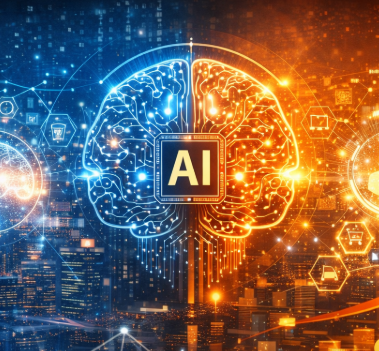AI & Digital Transformation
India Launches AI Centres of Excellence to Boost Innovation in Agriculture, Healthcare, and Sustainable Cities
The Union Government of India has launched three AI Centres of Excellence (CoEs) focusing on agriculture, healthcare, and sustainable cities, marking a significant milestone in the nation's AI innovation journey. Announced by Finance Minister Nirmala Sitharaman in the 2023-2024 Union Budget with a budget allocation of nearly ₹1,000 crore, these centres aim to drive technological advancements, support startups, and contribute to global public policy. The initiative brings together leading institutions, including IIT Delhi, AIIMS Delhi, IIT Ropar, and IIT Kanpur, to harness AI's transformative power for societal benefit. The Centres are expected to play a pivotal role in enhancing national health programs, improving agricultural yield, and reducing urban pollution.
India Unveils AI Centres of Excellence: A New Era of Innovation
India’s Union Government has launched three dedicated AI Centres of Excellence (CoEs) to foster innovation and technological advancements in key sectors—agriculture, healthcare, and sustainable cities. These CoEs are a part of a strategic initiative aimed at positioning India as a global leader in artificial intelligence, particularly in addressing challenges related to food security, public health, and urban sustainability.
The announcement follows a commitment made by Finance Minister Nirmala Sitharaman during the unveiling of the 2023-2024 Union Budget, where she declared a ₹1,000 crore budget for the establishment of these specialized centres. The CoEs are designed to promote AI research, support the growth of startups, and enhance India's capabilities in using AI for societal development.
AI CoEs: Boosting Growth in Key Sectors
Agriculture: Ensuring Quality Food and Enhanced Yield
IIT Ropar is leading the Centre of Excellence for Agriculture with a focus on "quality food for everyone" and "increasing yield." Pushpendu Singh from IIT Ropar highlighted the CoE’s mission to address challenges like diminishing agricultural land and enhancing the potential of Indian livestock. By leveraging AI solutions, the CoE aims to improve agricultural productivity and develop data-driven approaches for sustainable farming practices. With the rise of AI in agriculture, India is set to transform its farming sector, making it more efficient and sustainable.
Healthcare: Advancing National Health Programs with AI
A consortium of IIT Delhi and AIIMS Delhi is spearheading the Centre of Excellence for Healthcare, focusing on AI applications that can significantly improve patient care and diagnostics. Kritika Rangarajan, a professor at AIIMS Delhi, mentioned that the CoE is already contributing to the country's national health programs, with a focus on areas such as cancer screening, chronic disorder management, and visual impairment. IIT Delhi's role in this partnership involves building scalable platforms for integrating multiple AI applications, aiming to enhance digital public goods like the National Health Authority. This centre will not only boost healthcare innovation but also pave the way for a more integrated and data-driven health ecosystem in India.
Sustainable Cities: Reducing Pollution and Improving Urban Efficiency
The Centre of Excellence for Sustainable Cities, led by IIT Kanpur, is set to address some of the most pressing challenges faced by urban India. Sachidanand Tripathy of IIT Kanpur highlighted the centre’s efforts in developing an indigenous application to measure particulate matter (PM) levels in the air. The CoE is also focusing on leveraging AI for better urban planning and logistics, such as optimizing the movement of cargo lorries and trucks to enhance efficiency. By integrating AI into urban management, the centre aims to create cleaner and more efficient cities, contributing to India's sustainability goals.
An Event Inaugurating a Future of AI-Led Transformation
The launch event for these AI Centres of Excellence was a high-profile gathering that brought together leaders from various sectors. Education Minister Dharmendra Pradhan, who inaugurated the event, emphasized the potential of these CoEs to foster a new wave of AI startups, further strengthening India’s position in the global AI landscape. "These Centres of Excellence will spur the growth of new startups in the country and assume immense significance in the global public policy and economy sectors," Pradhan remarked, highlighting the anticipated impact of this initiative.
Sridhar Vembu, who co-chaired the apex committee behind the formation of the CoEs, praised the innovative proposals that had emerged for the centres. Vembu expressed optimism about the future of AI in India, emphasizing his willingness to support the solutions being developed through these centres.
The Road Ahead: AI’s Role in Shaping India’s Future
The establishment of these AI Centres of Excellence marks a new chapter in India's AI journey, aligning with the government's vision of leveraging emerging technologies to drive growth and development. As these centres begin their work, they are expected to serve as hubs for AI research, foster industry-academia collaboration, and develop AI-driven solutions tailored to India’s unique challenges.
The Centre of Excellence in healthcare, for instance, will support AI research aimed at improving diagnostic tools, while the agriculture CoE will focus on innovations that can help secure the country’s food future. Meanwhile, the sustainable cities CoE is positioned to address the environmental challenges of India’s rapidly urbanizing population.
These Centres of Excellence are not only a testament to India's commitment to AI but also a call to action for the nation’s talent and innovators to contribute to building solutions that benefit society at large. As AI becomes increasingly intertwined with daily life, initiatives like these underscore the importance of ethical AI practices and collaboration between government, academia, and industry.
Source: Money Control / Chat GPT








